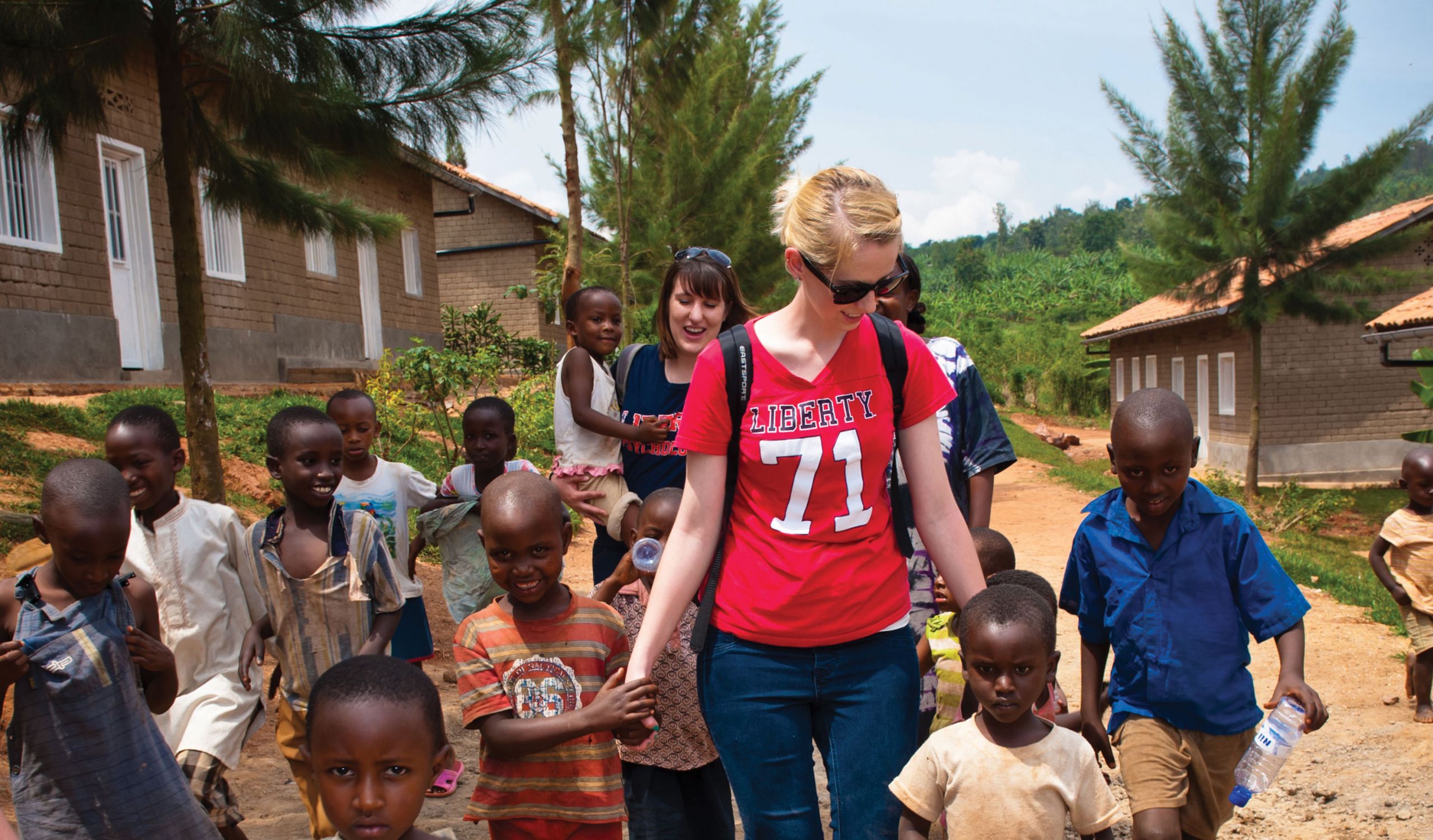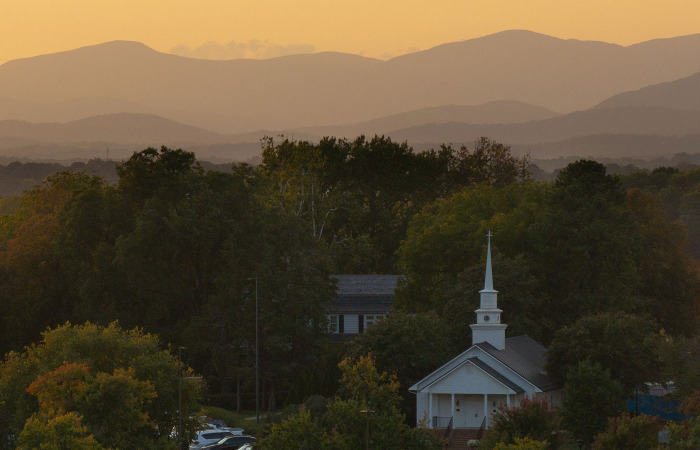Liberty University’s commitment to serving others is far-reaching — from the new “You Matter” initiative encouraging employees to provide superb customer service, to taking care of a community when disaster strikes, to building a preschool in Rwanda. Following the biblical example of being Christ’s witnesses “in Jerusalem, and in all Judea and Samaria, and to the ends of the earth,” Liberty is reaching out, making an impact near and far. Here are some of those stories.
Hotel magnate Horst Schulze addresses employees
Horst Schulze, who spoke in Convocation last year, returned to Liberty University as the guest speaker at an event that recast the vision of the “You Matter” campaign for more than 2,000 faculty and staff on June 19.
Schulze, founder and CEO of the Capella Hotel Group, came to the United States from Germany in 1965 and worked for the Hyatt and Hilton hotel groups before becoming COO of Ritz-Carlton in 1988. A legend in the hotel business, Schulze is a leading speaker in the area of customer service.
Schulze shared with employees the three principles he espouses in his ventures with Capella: have a vision, be committed to that vision, and implement the steps it takes to get there.
“You don’t go to work to go to work,” Schulze said. “You go to work to create excellence.” He focused on three things a customer expects from products or services they purchase: quality (free of defects), timely service, and caring service. He spoke on making the customer feel important at first contact.
“You (Liberty University) are in the business to give people value, to go out and change the world,” Schulze said.
He travels 200 days a year, and said that he sees Liberty as a “light” in America.
“Do not let your light go out,” Schulze said. “You are a light to everyone that you come in contact with, so make sure that you do not dim your light and make sure you value everyone.”
Power outage relief efforts aid community
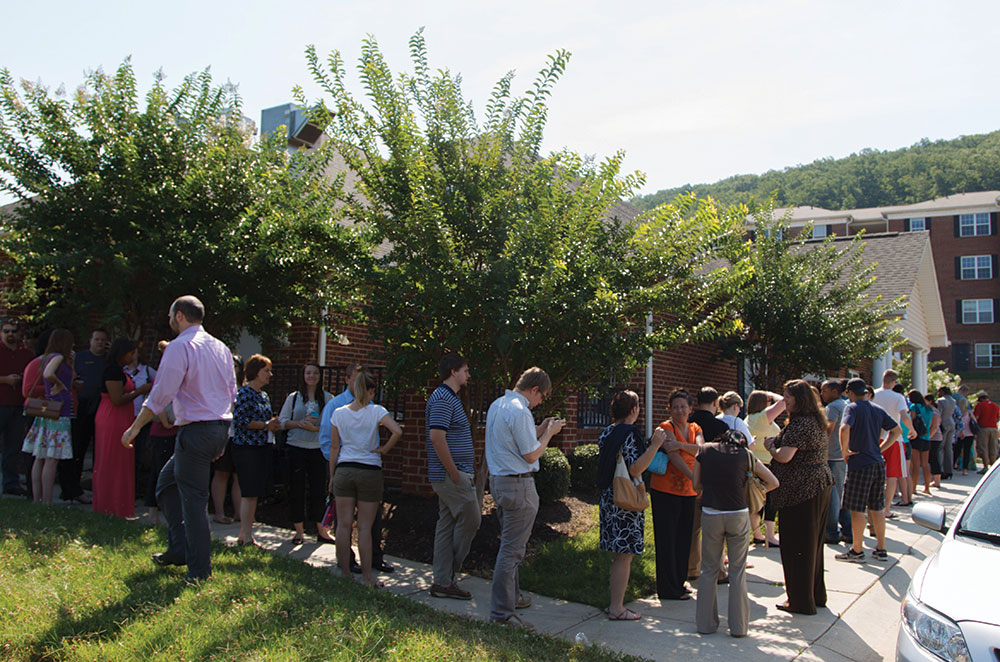
Liberty faculty and staff who lost power at their homes wait to be assigned rooms in a residence hall on July 2.
When a destructive derecho swept through Central Virginia in late June, Liberty University emerged as a key player in offering relief for affected residents from throughout the region.
The devastating storm, which packed crippling winds, toppled trees that snapped power lines, and left up to 72 percent of Lynchburg without electricity during some of the hottest days of a sweltering summer.
For at least a week after the storm, temperatures in the region often climbed above the 100 degree mark.
Without electricity, home air conditioners became lifeless and local residents were unable to perform basic life-sustaining activities such as cooking meals or washing their clothes.
Liberty and its partners — local governments, the American Red Cross, Sodexo, and the ministries of Thomas Road Baptist Church — provided comfort to those afflicted in the wake of the storm.
Because of its decade-long growth spurt, Liberty, which maintained its power, was in a unique position to offer shelter to those afflicted and to out-of-state power crews who responded to the emergency.
Liberty opened 14 residence halls, its dining facilities, pools, and laundromats to those who were trying to beat the heat. About 2,000 people were housed in residence halls; about 100 were out-of-area electrical workers unable to find hotel rooms when they arrived in town to respond to the widespread outage.
The Liberty Mountain Snowflex Centre opened for the public to enjoy free skiing and tubing, and the LaHaye Ice Center welcomed visitors with free ice skating.
“Liberty’s students have always been heavily involved in community service,” said Liberty President and Chancellor Jerry Falwell, Jr. “They donate hundreds of thousands of hours every year to the local community. This summer, Liberty, as an institution, took an active role in disaster relief. The campus is located near a main electrical transmission line that is rarely compromised by storms. We consider it a privilege to put into practice our Christian beliefs.”
Liberty Police Chief Richard Hinkley said God took an active hand in preparing the university to respond to the storm.
Just two days before the derecho hit, Liberty officials had met with representatives of local government and the American Red Cross to discuss how all could mutually respond to natural disasters. State government has been pushing localities to develop emergency response plans because of increased tornado activity throughout Virginia.
After the June storm hit, both Liberty and Thomas Road Baptist Church opened their facilities as cooling centers for those who had lost air conditioning for their homes.
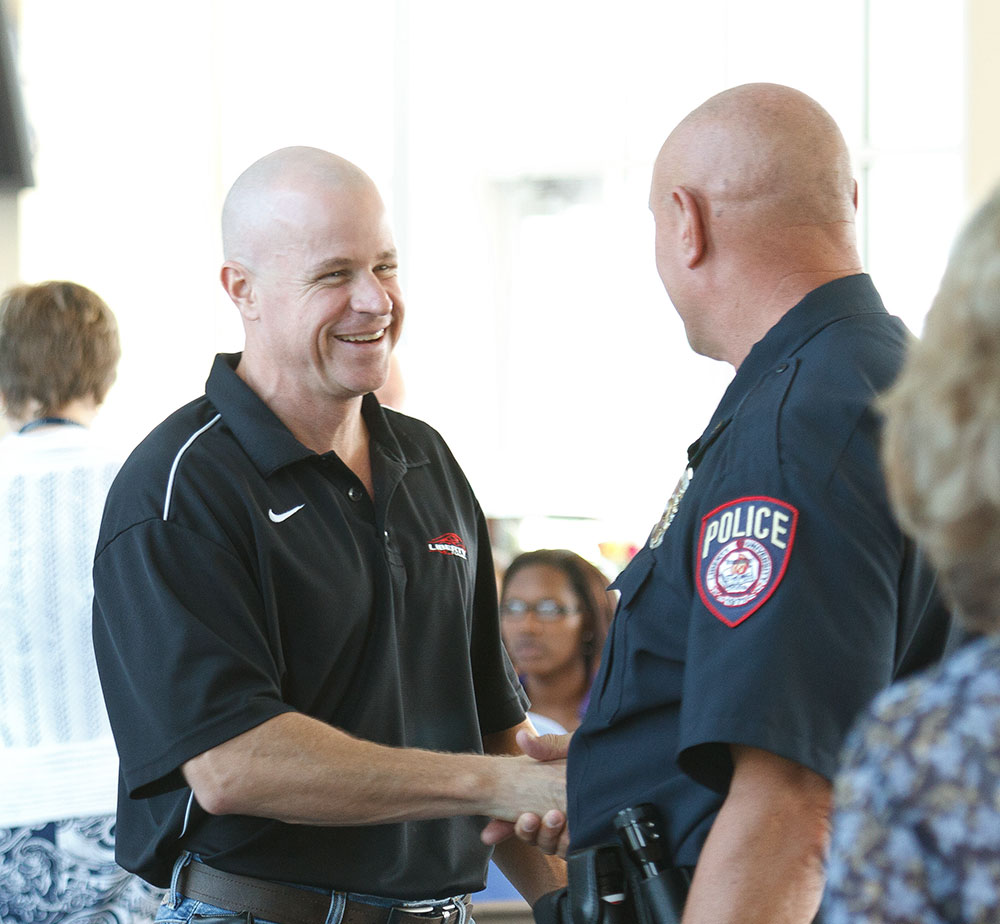
Lee Beaumont, vice president of Auxiliary Services, greets employees at an appreciation luncheon held on July 25.
“As things progressed following the storm, it became evident that people were going to need a place to stay,” Hinkley said.
It also became evident that local emergency rooms were going to need a backup venue to assist an excess of patients with medical needs. Both Liberty and TRBC offered use of their facilities.
Centra Health, another key local company, provided personnel to maintain a temporary emergency response medical center. The American Red Cross started referring patients to the Liberty-Thomas Road campus, Hinkley said.
“This by far was the most expansive emergency response we have ever had,” Hinkley said. “I think when you have an emergency of this magnitude people just pitch in and help out. It is just a matter of talking to one another.”
Lee Beaumont, Liberty’s vice president of auxiliary services, said the emergency response was a team effort.
“It all goes back to our Christian beliefs,” Beaumont said. “We are supposed to look out for one another.”
The post-storm response included meals at the dining hall for $3 (free for children and emergency personnel) and free ice to those who needed it.
Lori Madden, district manager for Sodexo, Liberty’s dining services provider, said the dining hall had planned to close for one week, with no students to serve on campus and no camps scheduled. That decision was quickly reversed when she saw the need and her already slim summer crew agreed to stay on.
“I think this has been a beautiful demonstration of ministry for this campus and we are just really happy to be a part of it,” Madden said that week.
More than 15,000 meals were served.
Madden said she met some families who had stocked up with groceries the day before the storm and had already spent their food budget.
“They were really devastated and they didn’t know where to go or what they were going to do to take care of their families,” she said.
Another family had traveled from Illinois with their two daughters who were preparing to be freshmen at Liberty this fall. When their hotel lost power, they were relieved to be able to come to the dining hall to eat, cool down, and make other housing arrangements.
Knowing that many children would come to the dining hall, Madden even went to the store to buy toys and games and set up a kids’ zone. Children’s movies were shown on a big-screen TV.
Lyn Mathews, a Boonsboro resident, ate with her two boys at the dining hall.
“I knew how big it was and that we would have the space for the boys to hang out,” she said. “The food is a nice addition — of course we don’t have anything in our fridge, it’s all gone. This is a gift. I think this is a great witness, what Liberty has done.”

People eat at Reber-Thomas Dining Hall during the power outage. More than 15,000 meals were served. Adults ate for $3; children and emergency service personnel were free.
Much of the success of the storm response came as a result of Liberty employees volunteering extra hours to help with the relief effort, including staff from the Liberty University Police Department, Housing Office, Auxiliary Services, and Field Operations/Facilities, under director Scott Starnes.
A few weeks later, Liberty held a special appreciation luncheon for those employees who went above and beyond their job duties.
Neal Askew, Liberty’s executive vice president, addressed the crowd.
“You didn’t have to do a lot of what you did. You made a lot of people’s lives better,” he told them. “It’s a wonderful thing to be a lighthouse to the community and reach out and help people when they’re in need.”
-
- To see a complete list of employees who contributed to the relief efforts, visit www.liberty.edu/stormrelief.
Restore Rwanda is changing lives
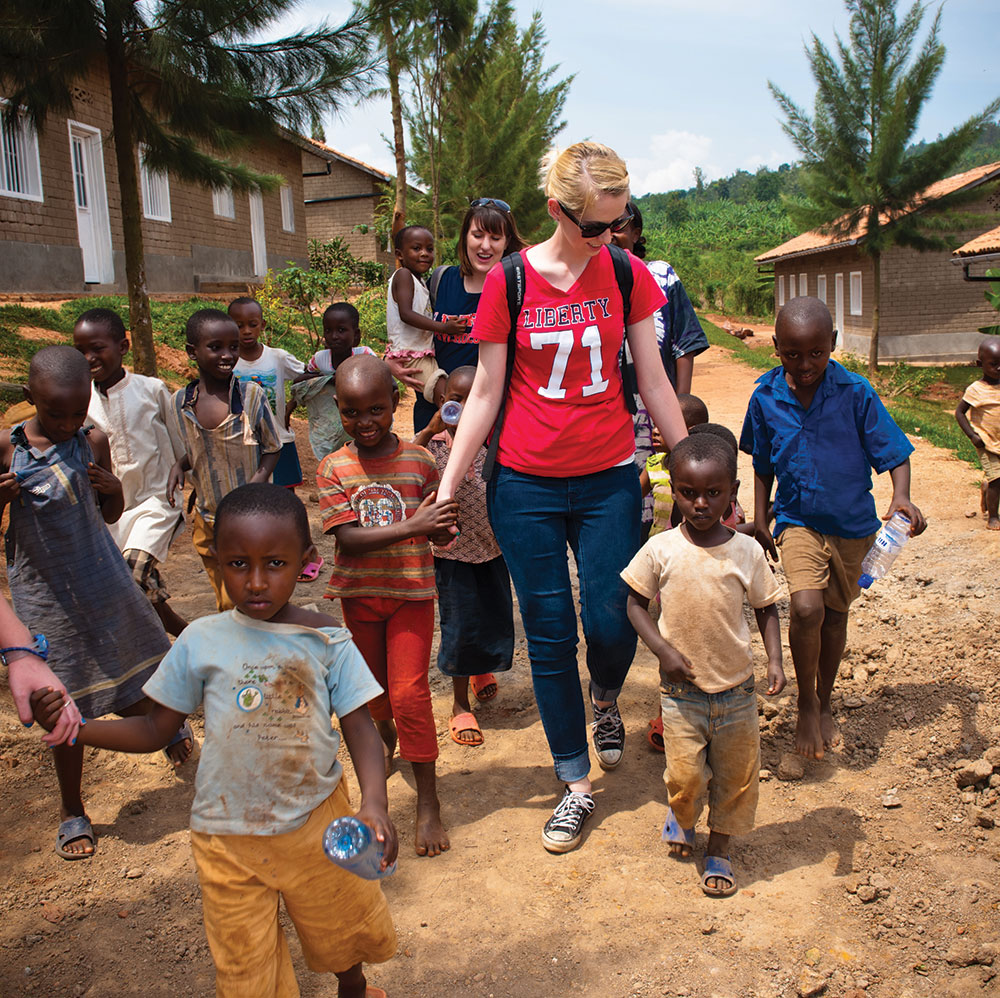 Liberty University students are helping a country heal from genocide.
Liberty University students are helping a country heal from genocide.
In 1994, 1 million men, women and children were killed in 100 days in Rwanda. Liberty’s involvement in the recovery first started in March 2010 when university leaders went there to meet with spiritual leaders to assess the many needs that still existed a decade later. This trip laid the foundation for the first team of Liberty students to arrive there in March 2011. The team, 21 students from Liberty’s counseling and psychology departments, trained teachers and pastors to serve as lay counselors.
In November 2011, Liberty returned with 19 students on a 10-day mission trip where they traveled to different villages and counseled victims as well as perpetrators of the genocide.
After seeing pictures of the team on Facebook, Becki Falwell, wife of Chancellor Jerry Falwell, Jr., immediately made contact with the students and soon learned that they had an even bigger goal: to change a village forever.
“I saw their passion and it touched me, and I said, ‘We can get the whole campus involved.’”
She called Johnnie Moore, vice president for executive projects, and asked for more information on the trips. (And, as it happened, she said it was God’s perfect timing because Moore was meeting with a Rwandan student at the time). They then planned a brainstorming meeting with staff from Liberty’s Center for Global Engagement, as well as students, and the Restore Rwanda campaign was born.
A Facebook page was created for the project, with pictures and a video. As announcements were made in Convocation, money began to pour in to help build a preschool building in the village.
“Not everyone can go on a weeklong mission trip,” Becki Falwell said, “so I wanted all Liberty students to feel connected to this village, that’s why we posted pictures and a video, to help them feel like they can personally help without making the trip. It’s the first time we have done something like this, adopted a whole village.”
In March 2012, five of the same Liberty students who made the trip that previous fall returned with the money that was raised and dedicated the site of the new building.
The school opened this summer with 37 students.
Liberty students contributed most of the $24,000 raised between February and April 2012, which was used to construct the building, furnish it, provide school supplies and uniforms for the children, and pay for a teacher, teacher’s aid, and a representative of the village who will walk the children to school each day.
With news of Restore Rwanda’s impact, other ministries are signing up to help.
One counseling student has raised $16,000 through her church for the project.
Liberty has partnered with World Help, a faith-based humanitarian organization, for the trips. Its founder and president, Vernon Brewer, was the first graduate of Liberty.
Alumnus Cyrus Mad-Bondo (’06, M.B.A.), now Africa regional director for World Help, attended the first day of school in the new preschool building on July 2.
“Many of these mothers would never have been able to send their kids to school (if it weren’t for Liberty),” he said. “It is just an exciting experience to watch kids who have been unschooled for quite some time, and for the first time enter a classroom building.”
He said the dropout rate for older (previously) unschooled children is high and the new preschool will help them stay in school.
“When these children enter school very early, they are likely to stay in school. These children can make life-altering decisions very quickly.”
Moore said future trips to Rwanda are being planned for November 2012 and March 2013. More building projects are also being planned to meet the needs of children in nearby villages.
“Some of the little children have been peeking in windows of the new school, wondering when they will also have an opportunity for education, and Liberty wants to be there to give it to them,” Moore said.
